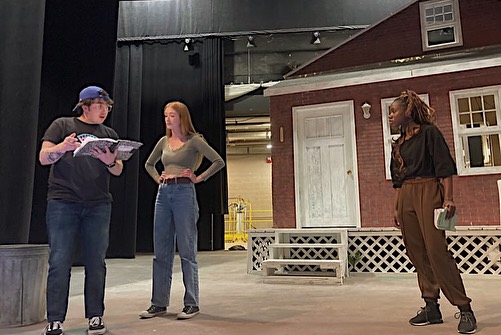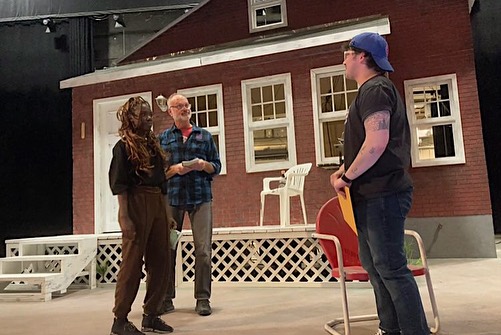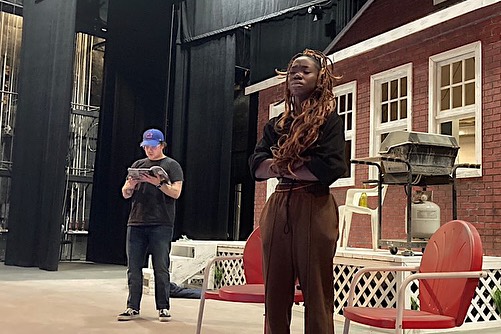SALT LAKE CITY — Proof, written by David Auburn, is a low-stakes story about math, mental illness and family. The play opens with Catherine (played by Betty Kalunga) sitting outside watching the stars, just as her dad (played by Joe Crnich) appears with a bottle of champagne to celebrate her 25th birthday. The set (designed by Spencer Brown) is simple: a brick house with a door to the backyard, and some chairs in the yard with a small table.

The play is naturalistic, relying on lighting and sound effects to establish a sense of place. When Catherine calls the police, sirens wail in the distance and the lights darken so that the audience can see the red and blue lights flashing. The loud heavy metal/rock music in the house that plays after Robert’s funeral is another example of using technical attributes to hint at time and place..
The house, in a way, ends up representing everything, almost becoming an additional character. Catherine has dropped out of school to tend to her dying father, who has succumbed to graphomania — a obsessive compulsion to write — and whose mind descended into lunacy before it eventually killed him. Catherine lived in this house while tending her father as her life slipped away from her. So many things happen in, or at, the house that we learn about later, including notebooks Robert had written, Catherine’s interaction with the police, the party, how Claire (played by Amelia Stensrud) paid the bills and intends to sell it.
Easily, the strongest part of the play is Kalunga’s performance. Although Catherine spends the bulk of the play being angry, sarcastic or confrontational, the emotional weight of Kalunga’s performance outclasses everyone else. As Catherine oscillates between indifference and paranoia, such as when she’s calling the police, and Hal is yelling that her dad wrote about her in a notebook. In that moment, Catherine is speaking into the phone, telling the police she is being robbed. Once Hal has her attention, she does not even look at him, preferring to stare off into the distance while Hal recounts Robert’s thoughts about his daughter. Many of the laugh-out-loud moments come from Catherine, who is quick witted in part because she is so defensive.

On top of that, Hal is so adorable. Miles Minshew does a fantastic job playing a Ph.D. student who is worried about his career prospects (“creativity peaks at twenty-three” / “math is a young man’s game”) and how he is not a genius like Robert was (who was famous in his early 20s for his work in mathematics). Hal tries, throughout the play, to be open and sensitive to Catherine, inviting her to listen to his band play or talking about how he went to therapy to get over a death in his own family. Over the course of the production, their bond was so thoroughly heartwarming that I found myself hoping that they would get together. Much of the success of the Hal-Catherine relationship’s success is due to the work of director, Jared Larkin, and the intimacy director Stephanie Stroud. Everything about Hal and Catherine felt very easy and something worth rooting for.
Joe Crnich is also fantastic to watch, and the flashbacks provide excellent insight into why Catherine chooses to stay home to care for him, what his illness was like and what Robert was like in the brief time he wasn’t ill. Crnich provides a humanness to the character that plays exceptionally well with Kalunga; you can almost believe they are actually related (or at least, like each other a great deal). And although Catherine is funny throughout the play, Crnich provides some real laugh out loud moments that almost eclipse hers.
Perhaps the weakest portions of the play are the script itself and Claire. In a play obsessed with age, there is no mention to how old Claire actually is. When she first appears on stage, she is wearing something akin to an ’80s power suit with several large gold necklaces around her neck. Toward the end of the play, she is dressed almost matronly while trying to convince Catherine that she is better off in New York. The script also does not create any space for Claire — and maybe this is on purpose. She has no real backstory, is not interested in math or a genius, and lacks the emotional vulnerability necessary to connect with either Catherine or Hal. For example, she is dismissive of Katherine’s concerns about how the police treated her when they came, and when she demands an apology, Claire is evasive. Claire, in general, does not seem to believe Catherine about anything and instead just attempts to assert her own will over her sister.
In some ways, Claire feels like an afterthought, meant to be an antagonistic force to trick the audience into thinking Catherine is slowly losing her mind, like her father. But she feels shoehorned in, and it feels that maybe Claire would have functioned better if she had been an estranged mom or ex-girlfriend, back to make amends or help because she was not around. Instead, Claire is the older sister from New York who offers little more than financial support to a situation she cannot comprehend at all.

It is tempting to walk away from Proof feeling that this play could have functioned much better, and just as strongly, if it were a love story between Hal and Catherine (two people who love both math and Robert). Even though Catherine struggles with vulnerability and shuts down when feeling upset or cornered, Hal is almost always gentle and continues to push, which typically causes her to cave in and open up to him. It is such a wonderful dynamic that the play spends a lot of time developing – just make it about them!
The strengths of Westminster University’s production Proof are in the directing, Minshew, Crnich, and Kalunga. Kalunga brings an emotional heft to the work that makes it compelling to watch, Minshew is a good counterweight to her intensity and Crnich seems to steal every scene he is in, providing an anchor for the rest of the cast. With no dynamic changes in lighting, and all the sound effects being natural noises, Proof is a character-driven and focused production that has several comedic, tender and highly charged moments for every character. Proof is a worthwhile production for those sensitive to the realities of having sick, or mentally ill, family members and the struggles in dealing with it alone.
[box]Proof plays Thursdays through Saturdays at 7:30 PM at the Courage Theatre in the Jewett Center for the Performing Arts on the campus of Westminster University. Tickets are $15. For more information, visit https://westminsteru.edu/student-life/events-and-performances/performing-arts-events/index.html.[/box]

